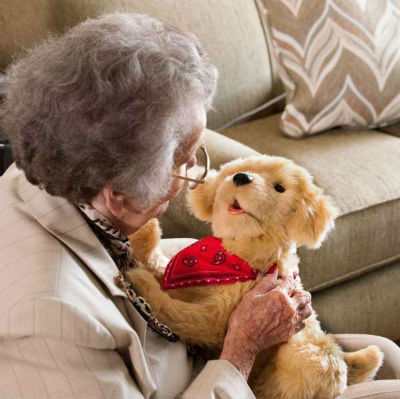Robotic Companion Pets Offer Comfort and Increased Engagement for Older Adults and Those Living with Dementia During COVID-19
TALLAHASSEE, Fla., - This week, the Florida Department of Elder Affairs (DOEA) began delivering over 375 therapeutic robotic pets to socially isolated seniors and adults living with Alzheimer’s Disease and Related Dementia (ADRD). The interactive pets help combat social isolation and depression among older individuals and people living with ADRD by improving overall mood and quality of life. Family caregivers may experience a reduction in stress, and caregivers benefit when companion pets allow increased engagement with the older adult and their environment.
 Department of Elder Affairs Secretary Richard Prudom said, “Under the leadership and guidance of Governor Ron DeSantis, we remain committed to serving the needs of older adults and their families. We know social isolation disproportionately affects older adults, and COVID-19 has required people with dementia and their caregivers to remain alone for extended periods of time. We look forward to delivering these therapeutic robotic pets to those who will benefit from their companionship.”
Department of Elder Affairs Secretary Richard Prudom said, “Under the leadership and guidance of Governor Ron DeSantis, we remain committed to serving the needs of older adults and their families. We know social isolation disproportionately affects older adults, and COVID-19 has required people with dementia and their caregivers to remain alone for extended periods of time. We look forward to delivering these therapeutic robotic pets to those who will benefit from their companionship.”
The robotic pets offer an alternative to traditional pet therapy, and research shows they have similar positive effects. They are designed to respond to motion, touch, and sound. Robotic cats and dogs are usually given to people with ADRD, but data has shown that using pets to decrease social isolation for older adults is highly successful.
Co-Founder and CEO of Ageless Innovation, Ted Fischer, said, “Independent clinical research has validated that Joy for All® Companion Pets promote and enhance meaningful interactions among older adults, their caregivers, and family members. We are thrilled to work alongside the Florida Department of Elder Affairs to ensure that hundreds of our aging loved ones can continue to find comfort, companionship, and joy with our interactive pets in this time of physical absence.”
“We hope these companion robotic pets may help calm individuals living with ADRD and provide some respite for their caregivers,” said Secretary Prudom. “In addition, we are pleased to expand the use of robotic pets to isolated older adults. Our participation in this innovative program will help many older adults improve their daily mood and give them a greater sense of well-being because of the companionship provided by the interactive pets.”


